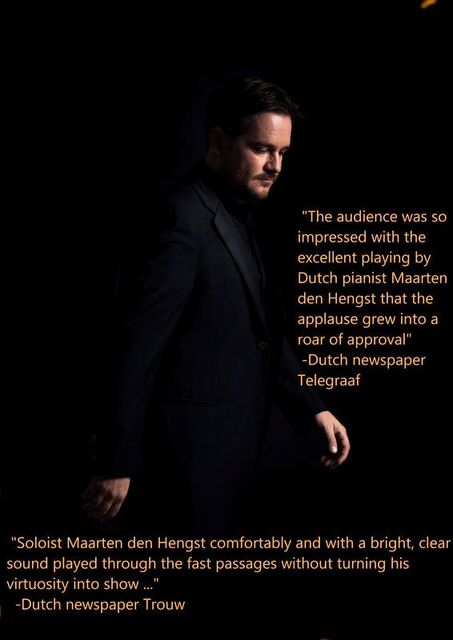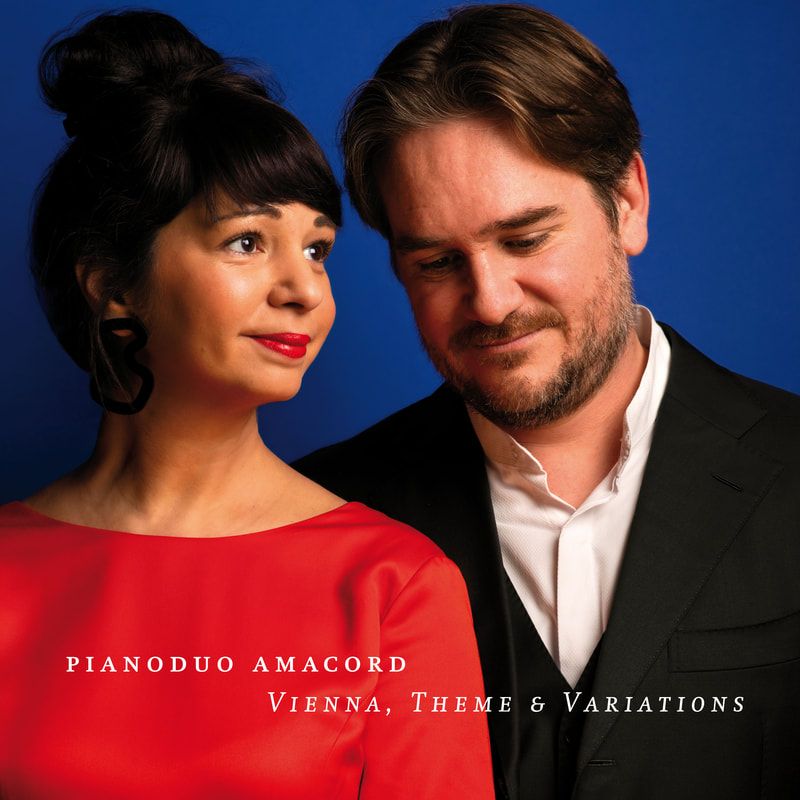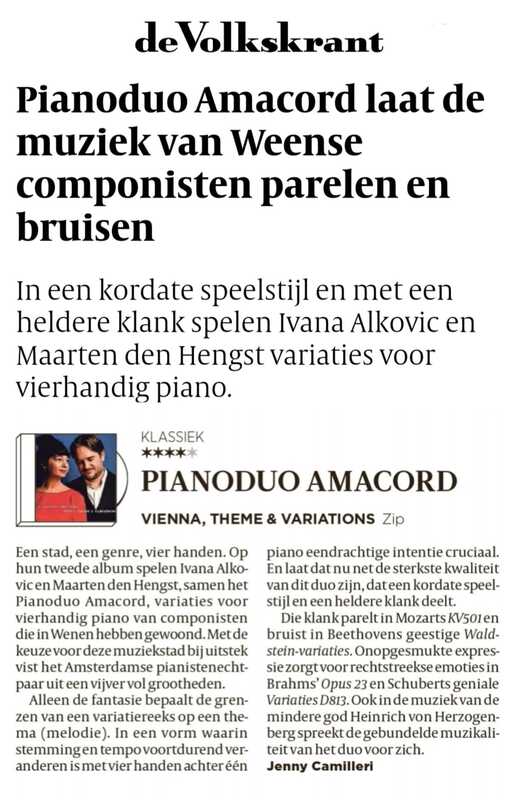Ivana Alkovic & Maarten den Hengst
'“Four hands on one piano,
a spectacle of intersecting lines and dynamics!”
“The two musicians play with engaging freshness, rich in nuances and with much love for small, picturesque details. These are interpretations that show a mature musicality and great intensity, full of excitement and imagination captivating the listener from the first to the last note.''
⭐⭐⭐⭐⭐
Pizzicato, Remy Franck's Journal about Classical Music, Luxembourg
a spectacle of intersecting lines and dynamics!”
“The two musicians play with engaging freshness, rich in nuances and with much love for small, picturesque details. These are interpretations that show a mature musicality and great intensity, full of excitement and imagination captivating the listener from the first to the last note.''
⭐⭐⭐⭐⭐
Pizzicato, Remy Franck's Journal about Classical Music, Luxembourg
NEWS
ALBUM RELEASE 08.03.2024.
“VIENNA, THEME & VARIATIONS”
A new program was gradually developed. While 'Magical Garden' (the previous CD) focused on the work of French composers, this time Pianoduo Amacord recorded an album with works written in the Theme & Variation form by great (and one less well-known) Viennese composers: Mozart, Beethoven, Schubert, Brahms and Herzogenberg.
Vienna is not only the city where the Variation Form reached its peak, it is also the city where pianists Ivana Alkovic and Maarten den Hengst met during their studies and Pianoduo Amacord was founded.
’’Vienna, Theme & Variations’’
W. A. Mozart: Andante mit Variationen , KV501
L. Van Beethoven: Acht Variationen über ein Thema des Grafen von Waldstein, WoO67
J. Brahms: Variationen über ein Thema von Robert Schumann, opus 23
H. von Herzogenberg: Variationen über ein Thema von Johannes Brahms, opus 23
F. Schubert: Acht Variationen über ein eigenes Thema, opus 35, D813
Vienna is not only the city where the Variation Form reached its peak, it is also the city where pianists Ivana Alkovic and Maarten den Hengst met during their studies and Pianoduo Amacord was founded.
’’Vienna, Theme & Variations’’
W. A. Mozart: Andante mit Variationen , KV501
L. Van Beethoven: Acht Variationen über ein Thema des Grafen von Waldstein, WoO67
J. Brahms: Variationen über ein Thema von Robert Schumann, opus 23
H. von Herzogenberg: Variationen über ein Thema von Johannes Brahms, opus 23
F. Schubert: Acht Variationen über ein eigenes Thema, opus 35, D813
Special thanks to Mozart House Vienna!
Animation movie credits: @Mozarthaus Vienna Errichtungs- und Betriebs GmbH
Animation movie credits: @Mozarthaus Vienna Errichtungs- und Betriebs GmbH
REVIEWS

https://musicwebinternational.com/2024/06/vienna-theme-variations-zip-records/
MUSIC WEB INTERNATIONAL
“There is a romantic story behind this programme. Ivana Alkovic and Maarten den Hengst met each other in Kaffeehaus Amacord in Vienna where they were both students at the Universität für Musik und darstellende Kunst. That this was a significant meeting is something of an understatement as they are now married and, alongside their work as Pianoduo Amacord, pursuing portfolio careers that include a variety of chamber music performing as well as having artistic directorship of the much in-demand Nieuwe Kerk Concerts in Haarlem.
I was initially a bit concerned with a programme consisting entirely of sets of variations, but this was dispelled almost as soon as the music started to take effect. Arranged chronologically, this is a well-considered collection of works with plenty of stylistic variety to take us from the 18th to the late 19thcenturies. The piano sound is world class, the added range of four-handed piano communicated in all its rumbling and sparkling richness from one of Hilversum’s best studio venues.
Mozart’s Andante with Variations KV 501 is like a condensed ‘opera without words’, taking a simple songlike theme and launching a sort of micro-narrative – creating scenes with each of its five variations from amorous or melancholy intermezzi to busy ensemble act finales. Beethoven was 20 years old when he composed the Eight Variations on a theme of Count Waldstein for his friend and talented pianist Count Ferdinand Waldstein, he of the ‘Waldstein Sonata’. This connection results in more pianistic virtuosity than Mozart’s piece, and with major and minor key tensions to play with and an abundance of technical wit and wizardry this is another work to relish, right up to the final section, which is a quite extensive set of variations within a variation, and something you could almost imagine popping up in Rossini’s ‘sins of old age’.
Schubert’s Eight Variations on an Original Theme is the central work here in every sense of the word and is the piece that set Pianoduo Amacord on their path towards assembling this programme. As Mozart delivers an operatic impression there is no escaping Schubert’s fingerprints as a composer with a magnificent legacy of song writing. The more pianistic variations are filled with theatricality, and Schubert’s glorious inventiveness when it comes to tonality is present throughout, but accompaniment plus melody variations such as the bittersweet Fifth Variation are the masterstrokes that keep bringing us back for more. Brahms’ Variations on a theme of Robert Schumann Op. 23 lands us soundly into the full-fat romanticism of the mid-19th century, but thankfully into the restrained hands of a composer focussed on clarity and musical communicativeness even where the notes are at their densest. This is the point at which the piano is challenged to project the power of an entire symphony orchestra, and Pianoduo Amacord does this with ease without losing that atmosphere of Viennese refinement possessed by the entire programme.
You might be forgiven for not having heard of Heinrich von Herzogenberg, but he was a friend of Brahms and as a conductor an advocate of his music. Herzogenberg shared Brahms’ admiration of Bach, and the opus number of his Variations on a theme of Brahms Op. 23 is a tribute his friend, using the latter’s song Die Trauernde as the basis for its theme. There is no escaping the influence of Brahms in this work, but it is a confident and effective masterpiece in its own right, and with its poetically quiet coda forms a fine finale to this superb recording.
Herzogenberg’s Op. 23 is not unknown to the record catalogues, and comparison might be made with Anthony Goldstone and Caroline Clemmow’s (another married couple) recording on the Toccata Classics label (review).
This only serves to point out the world class qualities in Pianoduo Amacord’s recording, which can stand comparison with any alternative for any work here, the CD also being nicely produced and documented with access points for each variation. Pianoduo Amacord’s artistic synergy and technical excellence is vibrantly evident in every bar of each score, and I warmly commend this release to any serious collector of quatre-mains piano music at its best.”
Dominy Clements
Availability: Zip Records
MUSIC WEB INTERNATIONAL
“There is a romantic story behind this programme. Ivana Alkovic and Maarten den Hengst met each other in Kaffeehaus Amacord in Vienna where they were both students at the Universität für Musik und darstellende Kunst. That this was a significant meeting is something of an understatement as they are now married and, alongside their work as Pianoduo Amacord, pursuing portfolio careers that include a variety of chamber music performing as well as having artistic directorship of the much in-demand Nieuwe Kerk Concerts in Haarlem.
I was initially a bit concerned with a programme consisting entirely of sets of variations, but this was dispelled almost as soon as the music started to take effect. Arranged chronologically, this is a well-considered collection of works with plenty of stylistic variety to take us from the 18th to the late 19thcenturies. The piano sound is world class, the added range of four-handed piano communicated in all its rumbling and sparkling richness from one of Hilversum’s best studio venues.
Mozart’s Andante with Variations KV 501 is like a condensed ‘opera without words’, taking a simple songlike theme and launching a sort of micro-narrative – creating scenes with each of its five variations from amorous or melancholy intermezzi to busy ensemble act finales. Beethoven was 20 years old when he composed the Eight Variations on a theme of Count Waldstein for his friend and talented pianist Count Ferdinand Waldstein, he of the ‘Waldstein Sonata’. This connection results in more pianistic virtuosity than Mozart’s piece, and with major and minor key tensions to play with and an abundance of technical wit and wizardry this is another work to relish, right up to the final section, which is a quite extensive set of variations within a variation, and something you could almost imagine popping up in Rossini’s ‘sins of old age’.
Schubert’s Eight Variations on an Original Theme is the central work here in every sense of the word and is the piece that set Pianoduo Amacord on their path towards assembling this programme. As Mozart delivers an operatic impression there is no escaping Schubert’s fingerprints as a composer with a magnificent legacy of song writing. The more pianistic variations are filled with theatricality, and Schubert’s glorious inventiveness when it comes to tonality is present throughout, but accompaniment plus melody variations such as the bittersweet Fifth Variation are the masterstrokes that keep bringing us back for more. Brahms’ Variations on a theme of Robert Schumann Op. 23 lands us soundly into the full-fat romanticism of the mid-19th century, but thankfully into the restrained hands of a composer focussed on clarity and musical communicativeness even where the notes are at their densest. This is the point at which the piano is challenged to project the power of an entire symphony orchestra, and Pianoduo Amacord does this with ease without losing that atmosphere of Viennese refinement possessed by the entire programme.
You might be forgiven for not having heard of Heinrich von Herzogenberg, but he was a friend of Brahms and as a conductor an advocate of his music. Herzogenberg shared Brahms’ admiration of Bach, and the opus number of his Variations on a theme of Brahms Op. 23 is a tribute his friend, using the latter’s song Die Trauernde as the basis for its theme. There is no escaping the influence of Brahms in this work, but it is a confident and effective masterpiece in its own right, and with its poetically quiet coda forms a fine finale to this superb recording.
Herzogenberg’s Op. 23 is not unknown to the record catalogues, and comparison might be made with Anthony Goldstone and Caroline Clemmow’s (another married couple) recording on the Toccata Classics label (review).
This only serves to point out the world class qualities in Pianoduo Amacord’s recording, which can stand comparison with any alternative for any work here, the CD also being nicely produced and documented with access points for each variation. Pianoduo Amacord’s artistic synergy and technical excellence is vibrantly evident in every bar of each score, and I warmly commend this release to any serious collector of quatre-mains piano music at its best.”
Dominy Clements
Availability: Zip Records
"Piano duo Amacord makes the music of Viennese composers sparkle and shine
In a striking performance and with a transparent sound Ivana Alkovic and Maarten den Hengst play variations for piano-4 hands.
One city, one genre, four hands. On their second album Ivana Alkovic and Maarten den Hengst, together Piano duo Amacord, play variations for four hands by composers who lived and worked in Vienna. By choosing this city of music par excellence the Amsterdam pianist couple is fishing from a pond filled with some of the greatest of all time.
Imagination alone defines the limits of a series of variations on a theme (melody). In a form where mood and tempo are continually shifting, working together in harmony is crucial for four hands on one piano. And that is precisely the strongest quality of this duo which combines a bold playing style with a clear sound.
This sound sparkles in Mozart’s KV501 and ripples in Beethoven’s witty Waldstein-variations. Unadorned expression makes for direct emotion in Brahm’s Opus 23 and Schubert’s brilliant Variations D813.In the music of the lesser god Heinrich von Herzogenberg too, the combined musical talent of the duo speaks eloquently for itself."
Jenny Camillery, De Volkskrant, 22.03.2024
https://www.volkskrant.nl/muziek/pianoduo-amacord-laat-de-muziek-van-weense-componisten-parelen-en-bruisen~b4a1d49f/
In a striking performance and with a transparent sound Ivana Alkovic and Maarten den Hengst play variations for piano-4 hands.
One city, one genre, four hands. On their second album Ivana Alkovic and Maarten den Hengst, together Piano duo Amacord, play variations for four hands by composers who lived and worked in Vienna. By choosing this city of music par excellence the Amsterdam pianist couple is fishing from a pond filled with some of the greatest of all time.
Imagination alone defines the limits of a series of variations on a theme (melody). In a form where mood and tempo are continually shifting, working together in harmony is crucial for four hands on one piano. And that is precisely the strongest quality of this duo which combines a bold playing style with a clear sound.
This sound sparkles in Mozart’s KV501 and ripples in Beethoven’s witty Waldstein-variations. Unadorned expression makes for direct emotion in Brahm’s Opus 23 and Schubert’s brilliant Variations D813.In the music of the lesser god Heinrich von Herzogenberg too, the combined musical talent of the duo speaks eloquently for itself."
Jenny Camillery, De Volkskrant, 22.03.2024
https://www.volkskrant.nl/muziek/pianoduo-amacord-laat-de-muziek-van-weense-componisten-parelen-en-bruisen~b4a1d49f/
“Het duo Amacord maakt zijn naam in alle opzichten waar in dit uitgekiend geprogrammeerde recital. Niet alleen in het dagelijks leven, maar ook als pianospelend paar laten ze horen perfect op elkaar ingespeeld te zijn. Met spel dat technisch tot in de puntjes verzorgd is en waarvan de liefde voor dit repertoire er aan alle kanten vanaf spat. De boeiende toelichting in zowel Nederlands als Engels werd geschreven door Ignace Bossuyt en Guido Tichelman zorgde voor een warmbloedige opname die altijd helder en doorzichtig blijft.”
Opus Klassiek, Siebe Riedstra, april 2024
https://www.opusklassiek.nl/cd-recensies/cd-sr/sramacord01.htm
Opus Klassiek, Siebe Riedstra, april 2024
https://www.opusklassiek.nl/cd-recensies/cd-sr/sramacord01.htm
Imagine how the piano sounded in the time of Brahms!
Live @Weesp Chamber Music Festival:
In this video Pianoduo Amacord plays on restored Blüthner grand piano from 1865!
"Well known artists like Brahms and Schumann were welcome guests in the Blüthner house. During their musical tours the artists reported about these instruments.”
@Andriessen piano’s-vleugels (Haarlem)
Live @Weesp Chamber Music Festival:
In this video Pianoduo Amacord plays on restored Blüthner grand piano from 1865!
"Well known artists like Brahms and Schumann were welcome guests in the Blüthner house. During their musical tours the artists reported about these instruments.”
@Andriessen piano’s-vleugels (Haarlem)



